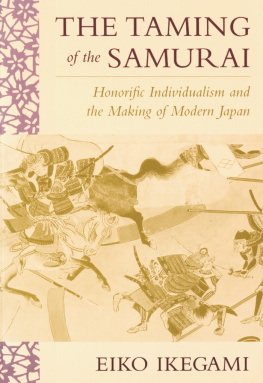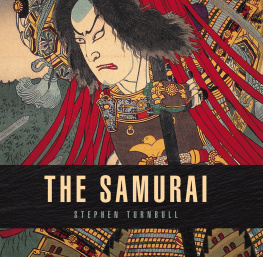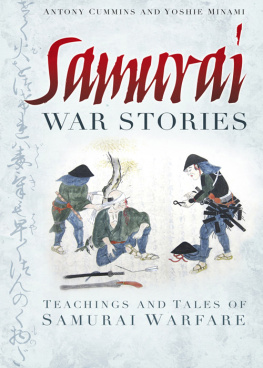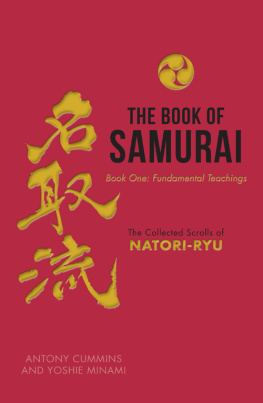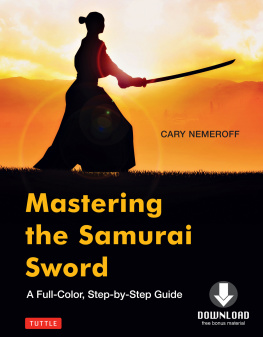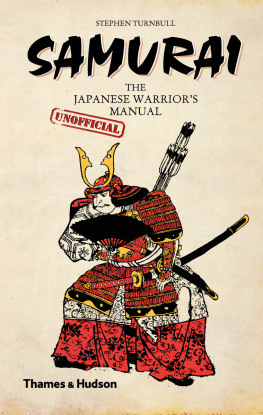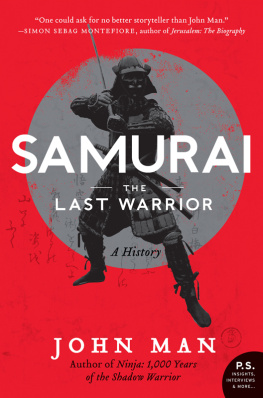Eiko Ikegami - The Taming of the Samurai
Here you can read online Eiko Ikegami - The Taming of the Samurai full text of the book (entire story) in english for free. Download pdf and epub, get meaning, cover and reviews about this ebook. publisher: Harvard University Press, genre: History. Description of the work, (preface) as well as reviews are available. Best literature library LitArk.com created for fans of good reading and offers a wide selection of genres:
Romance novel
Science fiction
Adventure
Detective
Science
History
Home and family
Prose
Art
Politics
Computer
Non-fiction
Religion
Business
Children
Humor
Choose a favorite category and find really read worthwhile books. Enjoy immersion in the world of imagination, feel the emotions of the characters or learn something new for yourself, make an fascinating discovery.
- Book:The Taming of the Samurai
- Author:
- Publisher:Harvard University Press
- Genre:
- Rating:4 / 5
- Favourites:Add to favourites
- Your mark:
- 80
- 1
- 2
- 3
- 4
- 5
The Taming of the Samurai: summary, description and annotation
We offer to read an annotation, description, summary or preface (depends on what the author of the book "The Taming of the Samurai" wrote himself). If you haven't found the necessary information about the book — write in the comments, we will try to find it.
The Taming of the Samurai — read online for free the complete book (whole text) full work
Below is the text of the book, divided by pages. System saving the place of the last page read, allows you to conveniently read the book "The Taming of the Samurai" online for free, without having to search again every time where you left off. Put a bookmark, and you can go to the page where you finished reading at any time.
Font size:
Interval:
Bookmark:

The Taming of the Samurai
Honorific Individualism and the Making of Modern Japan
Eiko Ikegami
Harvard University Press
Cambridge, Massachusetts
London, England
For my mother, Kiyok Ikegami
Copyright 1995 by the President and Fellows of Harvard College
All rights reserved
Printed in the United States of America
Publication of this book has been supported by a grant from the Frederick W. Hilles Publications Fund of Yale University.
First Harvard University Press paperback edition, 1997
Library of Congress Cataloging-in-Publication Data
Ikegami, Eiko.
The taming of the samurai : honorific individualism and the making of modern Japan / Eiko Ikegami.
p. cm.
Includes index.
ISBN 0-674-86808-0 (cloth)
ISBN 0-674-86809-9 (pbk.)
1. SamuraiHistory. 2. SamuraiConduct of life.
3. Bushido. 4. Ethics, Japanese. 5. JapanCivilizationTo 1868. I. Title.
DS827.S3I54 1995
952.008622dc20
94-36784
To trace all the strands of my debt to individuals as well as institutions would be impossible, and therefore I have to limit myself here to only a brief mention of some of those. I received a Fulbright fellowship that made it possible for me to finish graduate school at Harvard, after having started in Tsukuba, Japan. After I received my Ph.D., a research grant from the Harry Frank Guggenheim Foundation provided the timely and generous help that enabled me to travel to Japan at critical stages in my research. I was also fortunate to receive a fellowship from the Institute for Advanced Study at Princeton, which permitted me to prepare the first draft of the manuscript in 1991. It was a stimulating experience for me, not only because I was able to concentrate on my writing, but also because the interdisciplinary intellectual community at the Institute helped me to expand the scope of this project. I am particularly grateful to the faculty of the School of Social Science, Clifford Geertz, Albert Hirschman, Joan Scott, and Michael Walzer for their hospitality and generous support. In addition, I gladly acknowledge the various grants I have received since I joined the faculty at Yale University: Social Science Faculty Grants, a Whitney Humanities Center Research Grant, and Sumitomo Grants from the Council of East Asian Studies.
Although I often felt isolated while I was writing this book, struggling to find my own niche in environments totally different from my own cultural upbringing, many people gave me warm support and guidance. Among those, first I want to thank Orlando Patterson of the Department of Sociology at Harvard, who played a central role in supervising my dissertation and was always available for advice and encouragement. He kept an active interest in the development of this project after I finished my dissertation. I am especially indebted to him for our lively discussions regarding the notion of honor in general, as well as Japanese and European individualism and the honor culture of landed elites.
Another crucial part of the intellectual debt I accumulated at Harvard I owe to Professor Alessandro Pizzorno, now at the European University Institute in Florence, who introduced me to a wide perspective on power and discipline. He inspired me through his acute questioning on various aspects of Japan, prompting me to consider in more detail exactly what it was that Japanese experiences could contribute to the content of sociological theories. The third member of my dissertation committee, Ezra Vogel, has been an inspiration to me through his extensive knowledge of modern Japanese society and his ability to communicate across cultural barriers.
Various friends and colleagues have read parts of the manuscript at different stages and have helped me to sharpen my thinking through their generous comments. Among them are David Apter, Martin Collcutt, Deborah Davis, Paul DiMaggio, Michael Donnelley, Tom Eartman, Kai Erikson, Clifford Geertz, John A. Hall, Edward Kamens, Suzanne Keller, Herman Ooms, Charles Perrow, Albert Reiss, David Riesman, Theda Skocpol, Conrad Totman, and Valerio Valerie. I would especially like to thank William Kelly and Henry Smith, whose heroic readings of the entire manuscript provided detailed and informed comments that saved me from making mistakes in a number of places. Another crucial intellectual influence has been Charles Tilly, whose provocative essay War Making and State Making as Organized Crime inspired my sociological imagination when I was a graduate student. He later came to be interested in this project, and his encouragement was a great source of moral support.
I would also like to acknowledge the equally important stimulation and inspiration that I received at an earlier age in Japan, during both my undergraduate and my graduate studies. I thank Professors Asai Kiyoshi and Tsutsumi Seiji, who taught me Japanese classical literature, the field in which I majored as an undergraduate at Ochanomizu University in Tokyo. Completing Ochanomizus intensive four-year program in Japanese literature helped me to decipher the world of the samurai sociologically, though I was too young to appreciate it fully at the time. Professor Ayabe Tsuneo, then at Tsukuba University, first introduced me to the world of anthropological thinking and provided me with essential encouragement while I was finishing my studies abroad. Professor Sugiyama Haruyasu, in the Faculty of Law at Waseda University, introduced me to the field of Japanese legal history while I was conducting my initial dissertation research in 1986, something that proved to be of great use for the construction of this project.
Many friends have helped me in many ways, including trying to make my use of the English tongue less exotic. In this respect I am particularly fortunate to have received the sustained help of Betsy Fray, whose patient and intelligent copyediting has been essential. My thanks are due Lindsay Waters, Alison Kent, and Christine Thorsteinsson of Harvard University Press for their wise counsel and editorial help.
Finally, I want to express my thanks and appreciation to the two most important individuals in my life. I simply have no words to thank my mother, Kiyoko Ikegami, not only for providing unfailing support and affection, but also for showing me a model of Japanese discipline that combines head and heart in a strict and yet tender way. For my husband, Piet Hut, I have too many words to express my feelings. Briefly, I lovingly acknowledge the intellectual and emotional contributions to this project that only he could have made.
Illustrations are reproduced from the collections of Nishimura Hakubutsukan; Seikad; Tokugawa Reimeikai; Tokyo Kokuritsu Hakubutsukan; and Zenhji.
Ancient
(701) Taih code
HEIAN
(794) Heian (Kyoto) became the imperial capital city
Medieval
KAMAKURA
(1185) Minamoto clan defeated the Taira clan
(1192) Minamoto no Yoritomo became the shogun
MUROMACHI
(1333) The Kamakura shogunate collapsed
(1336) Ashikaga Takauji opened the shogunate
(1467) nin War
THE WARRING STATES (SENGOKU)
Early Modern
UNIFICATION BY ODA NOBUNAGA AND TOYOTOMI HIDEYOSHI
TOKUGAWA
(1603) Tokugawa Ieyasu established the shogunate
(1868) Meiji imperial restoration
The enigma of Japan, viewed through Western eyes, can be summarized by the question, How can a nation be so successful in the fields of industrialization and business management, while encouraging its population to overvalue collectivist thinking and the
Font size:
Interval:
Bookmark:
Similar books «The Taming of the Samurai»
Look at similar books to The Taming of the Samurai. We have selected literature similar in name and meaning in the hope of providing readers with more options to find new, interesting, not yet read works.
Discussion, reviews of the book The Taming of the Samurai and just readers' own opinions. Leave your comments, write what you think about the work, its meaning or the main characters. Specify what exactly you liked and what you didn't like, and why you think so.

